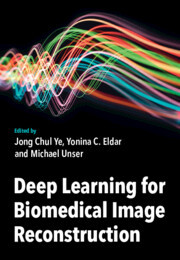Description
Deep Learning for Biomedical Image Reconstruction
Coordinators: Ye Jong Chul, Eldar Yonina C., Unser Michael
Discover the power of deep neural networks for image reconstruction with this state-of-the-art review of modern theories and applications.
Language: English
Subject for Deep Learning for Biomedical Image Reconstruction:
Publication date: 10-2023
400 p. · 17.4x25 cm · Hardback
400 p. · 17.4x25 cm · Hardback
Description
/li>Contents
/li>Biography
/li>
Discover the power of deep neural networks for image reconstruction with this state-of-the-art review of modern theories and applications. The background theory of deep learning is introduced step-by-step, and by incorporating modeling fundamentals this book explains how to implement deep learning in a variety of modalities, including X-ray, CT, MRI and others. Real-world examples demonstrate an interdisciplinary approach to medical image reconstruction processes, featuring numerous imaging applications. Recent clinical studies and innovative research activity in generative models and mathematical theory will inspire the reader towards new frontiers. This book is ideal for graduate students in Electrical or Biomedical Engineering or Medical Physics.
Part I. Theory of Deep Learning for Image Reconstruction Michael Unser: 1. Formalizing deep neural networks Jong Chul Ye and Sangmin Lee; 2. Geometry of deep learning Saiprasad Ravishankar, Zhishen Huang, Michael McCann and Siqi Ye; 3. Model-based reconstruction with learning: from unsupervised to supervised and beyond Yuelong Li, Or Bar-Shira, Vishal Monga and Yonina C. Eldar; 4. Deep algorithm unrolling for biomedical; Part II. Deep Learning Architecture for Various Imaging Modalities Haimiao Zhang, Bin Dong, Ge Wang and Baodong Liu: 5. Deep learning for CT image reconstruction Guang-Hong Chen, Chengzhu Zhang, Yinsheng Li, Yoseob Han and Jong Chul Ye; 6. Deep learning in CT reconstruction: bring the measured data to tasks Patricia Johnson and Florian Knoll; 7. Overview deep learning reconstruction of accelerated MRI Mathews Jacob, Hemant K. Aggarwal and Qing Zou; 8. Model-based deep learning algorithms for inverse problems Mehmet Akcakaya, Gyutaek Oh, Jong Chul Ye; 9. k-space deep learning for MR reconstruction and artifact removal Ruud J. G. van Sloun, Jong Chul Ye and Yonina C Eldar; 10. Deep learning for ultrasound beamforming Jaeyoung Huh, Shujaat Khan and Jong Chul Ye; 11. Ultrasound image artifact removal using deep neural network; Part III. Generative Models for Biomedical Imaging Jaejun Yoo, Michael Unser: 12. Deep generative models for biomedical image reconstruction Tolga C¸ukur, Mahmut Yurt, Salman Ul Hassan Dar, Hyungjin Chun and, Jong Chul Ye; 13. Image synthesis in multi-contrast MRI with generative adversarial networks Jaejun Yoo and Michael Unser; 14. Regularizing deep-neural-network paradigm for the reconstruction of dynamic magnetic resonance images Thanh-an Pham, Fangshu Yang and Michael Unser; 15. Regularizing neural network for phase unwrapping Michael T. McCann, Laur`ene Donati, Harshit Gupta and Michael Unser; 16. CryoGAN: a deep generative adversarial approach to single-particle cryo-em; Index.
Jong Chul Ye is a Professor in the Graduate School of AI at Korea Advanced Institute of Science and Technology (KAIST), Korea. He is currently an associate editor for IEEE Trans. on Medical Imaging, and a Senior Editor of IEEE Signal Processing Magazine. He is an IEEE Fellow, and was the Chair of IEEE SPS Computational Imaging TC, and IEEE EMBS Distinguished Lecturer. He is the author of Geometry of Deep Learning: A Signal Processing Perspective (Springer 2022).
Yonina C. Eldar is a Professor in the Department of Mathematics and Computer Science, Weizmann Institute of Science, Rehovot, Israel, where she heads the Center for Biomedical Engineering. She is also a Visiting Professor at MIT, a Visiting Scientist at the Broad Institute, and an Adjunct Professor at Duke University. She is a member of the Israel Academy of Sciences and Humanities, an IEEE Fellow and a EURASIP Fellow, and the recipient of the Technical Achievement Award of the IEEE Signal Processing Society. She is author of Sampling Theory (Cambridge, 2015), and co-editor of Convex Optimization in Signal Processing and Communications (Cambridge, 2009), Compressed Sensing (Cambridge, 2012), Information-Theoretic Methods in Data Science (Cambridge 2021), and Machine Learning in Wireless Communications (Cambridge, 2022).
Michael Unser is Professor in the Institute of Electrical and Micro Engineering, EPFL, Switzerland, where he also heads the Center for Imaging. He is a Fellow of the IEEE, an elected member of the Swiss Academy of Engineering Sciences, and a EURASIP Fellow. He is recipient of the 2008 Technical Achievement Award of the IEEE Signal Processing Society and the 2020 Academic Career Achievement Award from the IEEE Engineering in Medicine and Biology Society. He is co-author of An Introduction to Sparse Stochastic Processes (Cambridge 2014).
Yonina C. Eldar is a Professor in the Department of Mathematics and Computer Science, Weizmann Institute of Science, Rehovot, Israel, where she heads the Center for Biomedical Engineering. She is also a Visiting Professor at MIT, a Visiting Scientist at the Broad Institute, and an Adjunct Professor at Duke University. She is a member of the Israel Academy of Sciences and Humanities, an IEEE Fellow and a EURASIP Fellow, and the recipient of the Technical Achievement Award of the IEEE Signal Processing Society. She is author of Sampling Theory (Cambridge, 2015), and co-editor of Convex Optimization in Signal Processing and Communications (Cambridge, 2009), Compressed Sensing (Cambridge, 2012), Information-Theoretic Methods in Data Science (Cambridge 2021), and Machine Learning in Wireless Communications (Cambridge, 2022).
Michael Unser is Professor in the Institute of Electrical and Micro Engineering, EPFL, Switzerland, where he also heads the Center for Imaging. He is a Fellow of the IEEE, an elected member of the Swiss Academy of Engineering Sciences, and a EURASIP Fellow. He is recipient of the 2008 Technical Achievement Award of the IEEE Signal Processing Society and the 2020 Academic Career Achievement Award from the IEEE Engineering in Medicine and Biology Society. He is co-author of An Introduction to Sparse Stochastic Processes (Cambridge 2014).
© 2024 LAVOISIER S.A.S.

